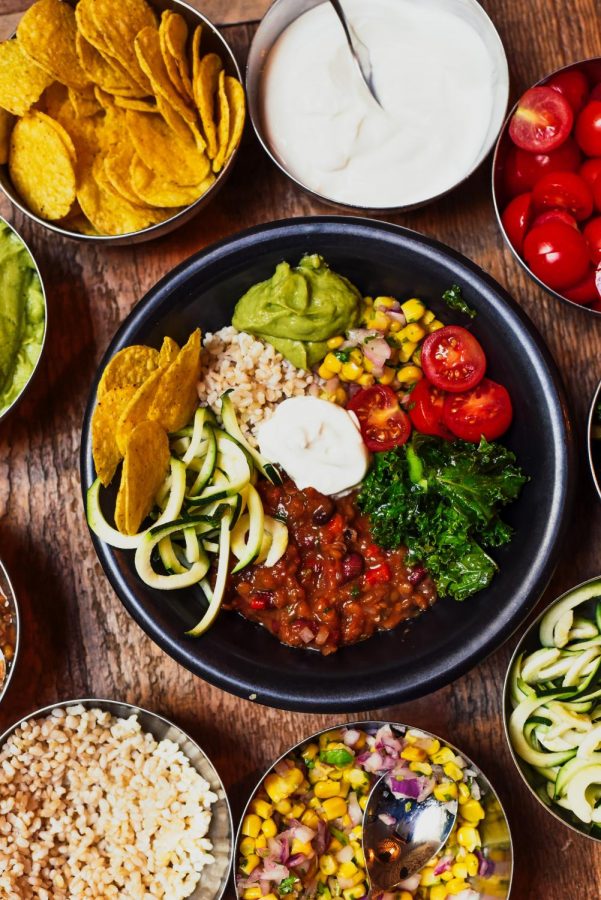Going Vegan
November 30, 2020
Veganism, a lifestyle that excludes all animal products, has recently gained popularity for health, environmental and moral reasons.
“I believe that going vegan is good for the environment and gives me the fulfillment of not supporting animal cruelty,” said junior Brian C.
Vegans do not eat any animal products in order to reduce their environmental footprint on earth.
“To produce meat, we must raise the cows that release large amounts of methane through natural gaseous processes. The whole process of slaughtering and transportation builds up a lot of carbon dioxide in the air,” said senior Tryphena Z.
Methane is a greenhouse gas like carbon dioxide (CO2), but the negative effect on the climate of Methane is 23 times higher than the effect of CO2. According to the Food and Agriculture Organization of the United Nations (FAO), agriculture is responsible for 18% of the total release of greenhouse gases world-wide. Nearly 60% of the world’s agricultural land is used for beef production.
“The meat industry takes up large amounts of land, which triggers deforestation to keep up with demands,” said Tryphena.
The clearing of forests to create new pastures is a driving force of deforestation, especially in Latin America where the Amazon is dominated by grazing. Therefore, vegans do not eat dairy, eggs or foods that contain animal products largely in protest of this issue.
“The impact of the meat industry on the animal itself is big. The process of exploiting the animal when harvesting the eggs or milking the cows is cruel. [Many] vegans believe it’s inhumane to keep them in captivity under harsh conditions as well,” said Tryphena.
The factory farming industry strives to maximize output while minimizing costs.
According to the People for the Ethical Treatment of Animals (PETA) website, “the giant corporations that run most factory farms have found that they can make more money by squeezing as many animals as possible into tiny spaces, even though many of the animals die from disease or infection.”
Vegans also object to the use of non-edible parts of animals. Every year, the global leather industry slaughters billions of animals and tans their skins and hides to follow fashion trends. Leather is used in bags, clothing, accessories, furniture and more.
“I don’t think animals should be specifically killed just for their leather, fur or skin to be used for fashion such as alligator skin bags, leather jackets or a fur lined jacket,” said junior Zeynep T.
There are economic factors that affect veganism as well. The difference in abundance of meat affects the rate of consumption of meat.
“Economics plays a role in the consumption of meat as well. In some places of the world, a pound of rice for example is cheaper than a pound of meat. So, I think that serves as a reason as to why some cultures have adapted to regarding meat as a delicacy,” said Brian.
The quantity of these resources plays a role in shaping cultures as well as diets. Along with vegans, similar beliefs of valuing a plant-based diet are shared with vegetarians. Vegetarianism is the practice of abstaining from only meat products for various reasons ranging from animal cruelty, environmental preservation, or religion – which is a similar basis to veganism.
“[Following] a plant-based diet helps the environment because you’re eating cleaner food and supporting the ecosystem,” said junior Eshani M., who is vegetarian.
Plant-based diets in comparison to diets rich in animal products are more sustainable because they use fewer natural resources. However, the debate around the health effects of veganism is not yet settled.
“I believe that there are many health benefits to veganism. You’ll have a longer life expectancy and a lower risk of heart disease and cancer,” said Brian C.
According to researchers from the “Physicians Committee for Responsible Medicine,” risk of death from cardiovascular disease is reduced by 40%, coronary heart disease risk is reduced by 40%, blocked arteries are unblocked partially or fully in as many as 91% of patients and hypertension risk drops by 34% as a result of maintaining a plant-based diet.
“A plant-based lifestyle, when it comes to nutrition, clearly cuts down on so many of the problems people face later in their life, as it relates back to heart disease and cancer because of the certain things found in meat,” said health teacher John Foley.
Some meats are high in saturated fat, which can raise cholesterol levels in blood. However, meat consumption, when controlled, can be important for a healthy and balanced diet. Although meat is considered a staple in a healthy diet, there is hesitancy among those trying to convert to a plant-based diet or lifestyle.
“Meat is a great source of protein and [contains] healthy fats. But as with anything, as long as it’s done in moderation, eating meat has its benefits as well. Nowadays, most experts are recommending that it is most beneficial to have a 70% plant-based diet, and a 30% mix of high-quality proteins,” said Foley.
Meats such as pork, chicken, lamb and beef are all incredibly rich in protein. Providing us with iron and vitamin B12, meat is a source of protein, minerals and vitamins in our diet. Vegans and vegetarians get these nutrients from other sources.
“[As a vegan], I take daily supplements and add other foods that are rich in protein to my diet, such as tofu,” said Brian C.
However, there are certain precautions that are advisable to stay healthy on a plant-based diet.
“It is possible to get all of your nutrients from supplements and an all plant-based diet. However, it is important to make sure that you are meeting your requirements by seeing a doctor or nutritionist,” said Foley.🔳




